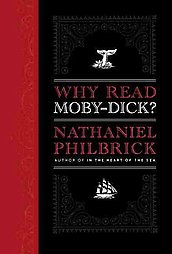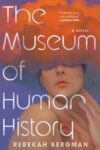 Today Viking Press released Why Read Moby-Dick?, a slim volume written by Nathaniel Philbrick that is exactly what it sounds like. Philbrick, best known for his National Book Award-winning In the Heart of the Sea: The Tragedy of the Whaleship Essex (about, duh, the event that inspired Melville to write Moby-Dick in the first place), really, really likes Moby-Dick, which is cool, and really, really knows a lot about Moby-Dick, which is cool too, but the end sum reads less like a critical analysis and more like the best book report ever.
Today Viking Press released Why Read Moby-Dick?, a slim volume written by Nathaniel Philbrick that is exactly what it sounds like. Philbrick, best known for his National Book Award-winning In the Heart of the Sea: The Tragedy of the Whaleship Essex (about, duh, the event that inspired Melville to write Moby-Dick in the first place), really, really likes Moby-Dick, which is cool, and really, really knows a lot about Moby-Dick, which is cool too, but the end sum reads less like a critical analysis and more like the best book report ever.
Here’s the quickest version: Moby-Dick is a great book, and, as Philbrick writes, an important one. “As individuals trying to find our way through the darkness, as citizens of a nation trying to live up to the ideals set forth in our constitution, we need, more than ever before, Moby-Dick.” It’s a nice sentiment, and one repeated endlessly over the next 120 pages, but it’s one we already all know by heart.
The question that concerns me the most is not why read Moby-Dick?, but why read Why Read Moby-Dick? I’m still trying to decide whether the fact that this book exists is even a positive thing. Sure, one can argue yes it is – any book that is championing a text is beneficial to that text. But it’s different for Moby-Dick. 100 years ago no one had heard of Herman Melville, and when critics began realizing and articulating the value of his work that was unequivocally a good thing for his books. Now? Not so much. In a market now oversaturated with Moby-Dick already (earlier this month Tin House Books released Matt Kish’s Moby-Dick in Pictures: One Drawing for Every Page), this book adds, at most, a mixed layer of fanfare and kitsch to the discussion. If anything, the fact that this book exists is a bad sign for Moby-Dick – can you imagine anyone reading or writing a book called Why Read Hamlet?
Melville’s greatness lies not just in his genius but also in his torment. Moby-Dick’s history of critical and commercial failure should be familiar, and Melville’s writing resilience in the face of these conditions is as noble as it is tragic. Jonathan Franzen, in his ballyhooed “Harpers” essay, writes: “Reading Melville’s biography, I wish that he’d been granted the example of someone like himself, from an earlier century, to make him feel less singularly cursed.” I can’t help but agree. Anyone who feels even an itch of literary ambition should heed Melville’s plight and thank him for profusely for it. Why read Why Read Moby-Dick? I really can’t tell you. Why read Moby-Dick? If you even have to ask, it may be pointless.
This post may contain affiliate links.








